Wednesday Feb 18, 2026
Wednesday Feb 18, 2026
Monday, 26 August 2024 00:10 - - {{hitsCtrl.values.hits}}
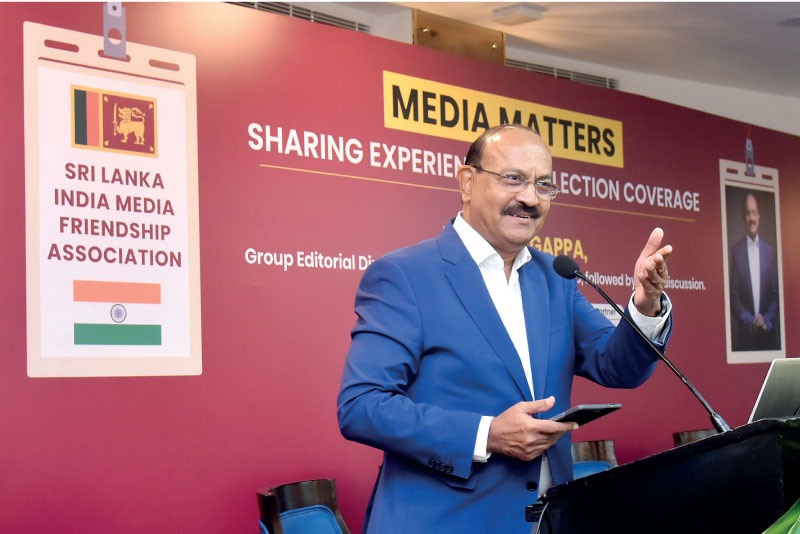
India Today Group Editorial Director (Publishing) and India Today magazine Editor Raj Chengappa
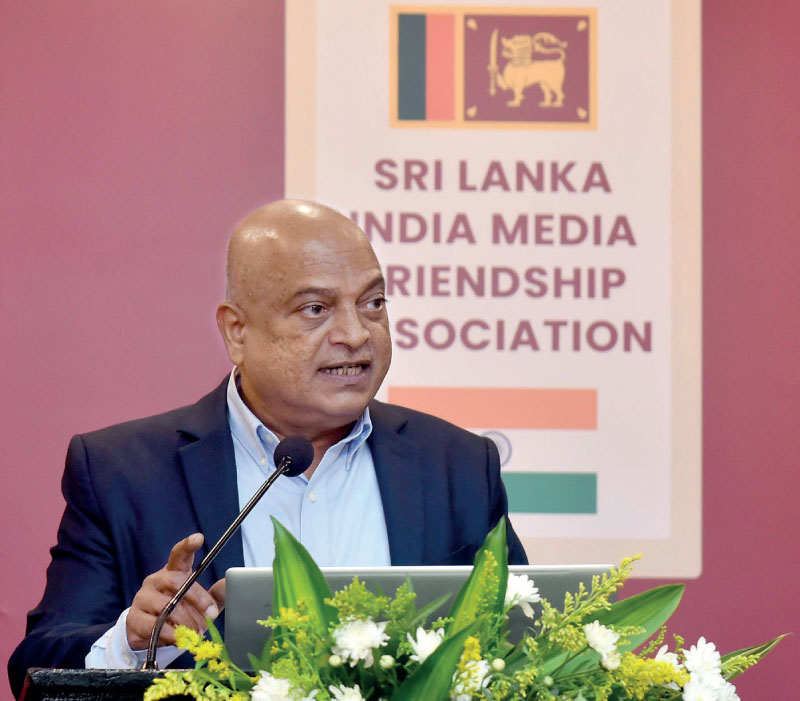
SLIMFA President Daily FT Editor and CEO Nisthar Cassim
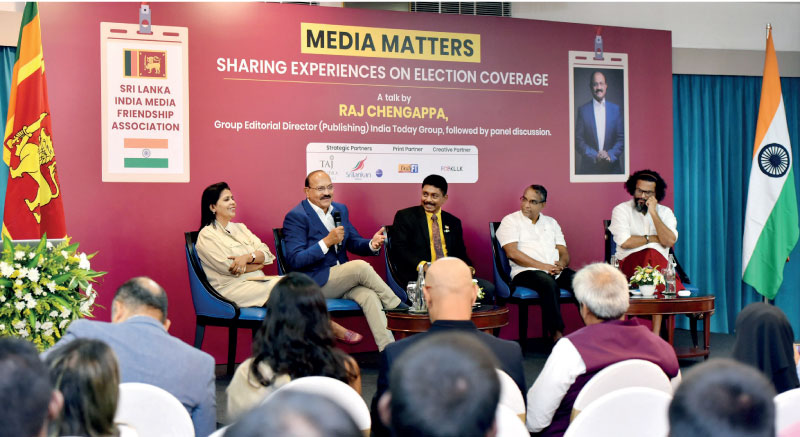
By Michelle Therese Alles
|
– India Today Group Editorial Director (Publishing) and India Today magazine Editor Raj Chengappa |
|
PAFFREL Executive Director Rohana Hettiarachchi |
|
– PAFFREL Executive Director Rohana Hettiarachchie |
|
Investigative journalist, senior editor, trainer, researcher, and rights advocate Dilrukshi Handunnetti |
|
International award-winning investigative journalist, senior editor, trainer, researcher, and rights advocate Dilrukshi Handunnetti |
|
Serial entrepreneur, former corporate senior executive, columnist, and public speaker Saliya Weerakoon
|
|
– Serial entrepreneur, former corporate senior executive, columnist, and public speaker Saliya Weerakoon |
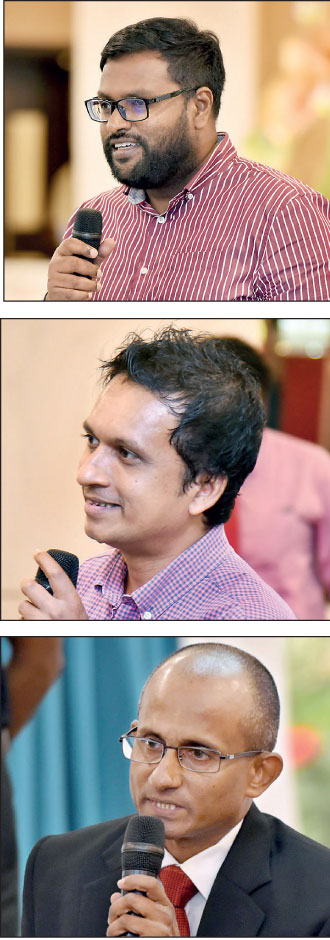 |
The newly formed Sri Lanka India Media Friendship Association (SLIMFA) recently held a forum to discuss the evolving role of media in shaping public opinion and voter behaviour, with a focus on the recent Indian General Elections and the upcoming Presidential Election.
Bringing together leading media professionals, journalists, and political analysts, the forum served as a platform for insightful dialogue on the power of journalism and its responsibility in maintaining electoral integrity. The SLIMFA’s inaugural event was also part of the Bharat Sri Lanka Maithri Week from 12 to 18 August commemorating India’s 78th Independence Day.
The forum was conceptualised in the context of the recent 2024 Indian election which was the largest democratic exercise in history and the most expensive in the world, as well as Sri Lanka bracing for a Presidential election with a record 38 candidates on 21 September.
The keynote was delivered by highly-recognised and award-winning Editor of India Today magazine and Editorial Director (Publishing) of the India Today Group Raj Chengappa who shared his perspectives on India’s recent election and the media. His keynote and the discussion to follow will help the Sri Lankan media to better understand and perform its due role.
The panel comprised People’s Action for Free and Fair Elections (PAFFREL) Executive Director Rohana Hettiarachchie, international award-winning investigative journalist, senior editor, trainer, researcher, and rights advocate Dilrukshi Handunnetti, and experienced serial entrepreneur, former corporate senior executive, columnist, and public speaker Saliya Weerakoon.
Raj Chengappa, in reflecting on his career, recalled covering some of Sri Lanka’s most critical moments, including the civil war and its key turning points. His early assignments as a journalist brought him face-to-face with the complex and turbulent history of the country, shaping his long-standing connection with Sri Lanka’s political landscape.
Returning to the present, he acknowledged Sri Lanka’s evolving political environment, and expressed a desire for a meaningful exchange of perspectives.
He also offered a glimpse into some of the strategies employed by India Today, drawing comparisons between Indian and Sri Lankan electoral landscapes.
Reflecting on India’s vast electoral scale, Chengappa observed, “With 968 million voters and a turnout of 642 million in 2024, covering India’s elections is a monumental task.” He emphasised the diversity, noting that Tamil Nadu, with its 62 million people, could be a country on its own.
Chengappa explained that India Today begins its election coverage well before the polls, citing a key moment when Bihar’s Chief Minister Nitish Kumar realigned with the BJP, shifting the political landscape. He noted, “Alliance shifts play a decisive role, much like the political dynamics in Sri Lanka.”
Chengappa emphasised teamwork in election coverage, stating, “Crafting powerful narratives requires a coordinated team effort.” He praised the collaborative spirit in Sri Lankan media, noting the shared challenges and opportunities in documenting democracy across the region.
SLIMFA President Nisthar Cassim said the Association comprises participants, who have been to India under familiarisation visits and other programs supported by the Government of India.
It was formed to promote exchanges between the media fraternity, enhance awareness of contemporary India, foster research and writing on India-Sri Lanka Partnership, promote new ideas to greater people to people ties, and support capacity building programs.
The Patron is the High Commissioner of India in Sri Lanka Santosh Jha and the Advisor is the Head of the Press, Information and Culture wing of the Indian High Commission. Cassim said going forward the Sri Lanka India Media Friendship Association hopes to conduct similar events taking up different, timely and relevant themes under the title of “Media Matters” thereby adding value to the broader media community and Indo-Lanka relations. He also said the SLIMFA will continue to engage with all stakeholders and seek their advice and support. The inaugural SLIMFA event was supported by strategic partners Taj Samudra Colombo and SriLankan Airlines.
Following are excerpts from the panel discussion moderated by SLIMFA's Executive Board member and Head of English and Foreign News at Sri Lanka Rupavahin Prasad Dodangodage
Q: Raj, given the circumstances of this year’s elections in Sri Lanka, what advice would you offer to journalists here? How should they approach and analyse these scenarios to effectively report on them?
First, I must say that Sri Lankan journalists are highly competent and do an outstanding job. Even after 40 years in the industry, I believe that continuous learning is essential. Journalism is like an ongoing university—we never truly ‘arrive’; we constantly need to adapt and evolve.
I was fortunate to work with one of India’s greatest photographers, Raghurai, early in my career. He told me something that stuck with me: “The moment you think you’ve made it, you’re finished.” This applies to journalism as much as it does to any other profession. We need to keep learning, not just from our local experiences, but from the broader global landscape. Journalism today is incredibly dynamic and complex, with the media expanding and democratising more than ever before.
In this rapidly evolving media environment, where anyone can start a blog or a podcast and gain a massive following, it’s crucial that we as journalists remain grounded in the fundamentals of our craft. The most important thing a journalist has is their credibility. Without it, trust is lost, and once that happens, your audience—whether readers, viewers, or listeners—will turn away.
Today, with media being more accessible and varied, the challenge is to maintain those standards of accuracy, balance, and thoroughness. It’s easy to chase sensationalism for quick numbers, but that’s a short-term strategy. The real value comes from deep research, talking to multiple sources, and presenting a well-rounded, unbiased perspective. This not only earns trust but also makes your work more impactful and respected.
So, while the tools and platforms have changed, the cardinal principles of journalism—such as verifying information and presenting a balanced view—remain as critical as ever. It’s like in cricket: one of the basic rules is to always ground your bat when you run. In journalism, that ‘grounding’ is your rigorous commitment to truth and accuracy.
Q: Rohana, you mentioned a new approach to monitoring and regulating media funding during the election period. Could you briefly explain this new process to us?
This election is particularly significant because, for the first time in Sri Lankan history, we are implementing a campaign finance ceiling. The Election Commission has been consulting with political parties and candidates, and they are likely to set a ceiling amount per voter. With approximately 17 million voters, even a modest per-person ceiling could result in substantial total campaign budgets.
This time, each candidate will be required to submit two reports after the election. The first is an income report detailing all sources of funds, both cash and in-kind, including names, ID numbers, and amounts. The second report is an expense report that must include every expenditure with evidence, all to be submitted within three weeks after the election.
However, a key issue is the lack of a mechanism in Sri Lanka to verify these reports. There is no established system under the law to allow the election management body to assess the accuracy of the submitted information. To address this, civil society organisations, observer groups, the Election Commission, the Bribery Commission, the Human Rights Commission, and other stakeholders have come together to create a web tool to monitor campaign finance.
Q: Dilrukshi, with your vast experience in investigative journalism, how do you view the current landscape, especially during this election period and in our rapidly evolving digital era? What key challenges do journalists face in election reporting and day-to-day journalism in this digital age?
Before addressing your main question, I’d like to briefly touch on an important issue: women’s representation in politics, which ties into investigative journalism. It’s striking that, after 76 years, Sri Lanka has only had 60 female legislators since Adeline Molamure. This statistic alone highlights a significant systemic issue. The barriers women face, both societal and institutional, are immense, and the political establishment must address why women are still underrepresented. Women make up 56% of the electorate but remain largely absent from decision-making roles.
Regarding the challenges of investigative journalism, especially in the context of elections and the digital age: the core principles of journalism remain unchanged. It’s about getting the basics right—researching thoroughly, verifying information, and presenting balanced, well-rounded stories. The digital era brings both opportunities and challenges. While it allows for quicker dissemination of information, it also increases the risk of misinformation and the need for fact-checking.
Investigative journalism during elections is critical because it helps uncover truths that might otherwise remain hidden, influencing public opinion and the electoral process itself. However, the task has become more challenging due to the rise of digital disinformation campaigns and the complexities of modern data journalism. Despite these challenges, the role of the journalist remains crucial: to dig deeper, ask the hard questions, and provide the public with the information they need to make informed decisions. This election is particularly important given Sri Lanka’s recent economic challenges, making thorough and responsible journalism more vital than ever.
Q: Saliya, in your article from a year ago, you predicted that winning the digital war would be crucial for the next presidential election, emphasising the shift from traditional to digital campaigning. How do you see the current state of this digital battle? Have things unfolded as you expected, or are there new developments and challenges in the digital campaign landscape?
Reflecting on the brutal elections of my youth, where violence was the norm, I deeply appreciate how organisations like PAFFREL have shaped a better electoral process in Sri Lanka. My political upbringing, influenced by my grandfather, taught me the importance of understanding politics to navigate betrayal and manage expectations. The tragic loss of my brother in 1989 was a pivotal moment, steering me toward nonviolence and reinforcing my belief in the power of the pen over physical conflict.
In August 2023, I wrote about the critical role of winning the digital war in modern elections. My experiences covering elections in India and other countries have shown how digital platforms have reshaped political campaigns. Credible journalism is vital in shaping public opinion, especially as misinformation spreads rapidly.
Journalists must report responsibly, balancing the need to inform with the risks of fake news. As the digital age transforms the political landscape, journalism must evolve to maintain credibility and influence. Winning the digital battle is key to winning elections, and our role as journalists have never been more critical.
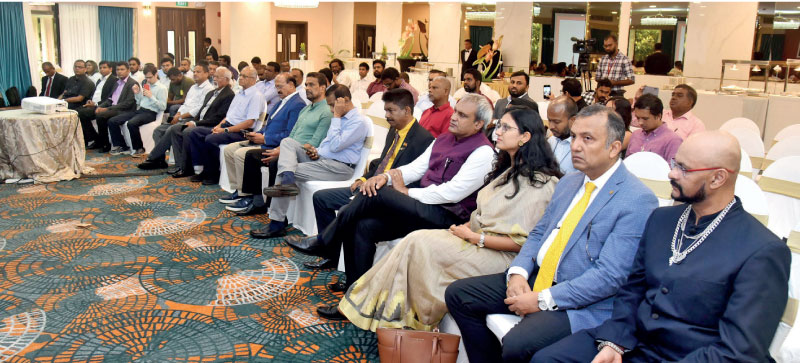


Pix by Ruwan Walpola

Those who are interested in joining the Sri Lanka India Media Friendship Association could email to [email protected]